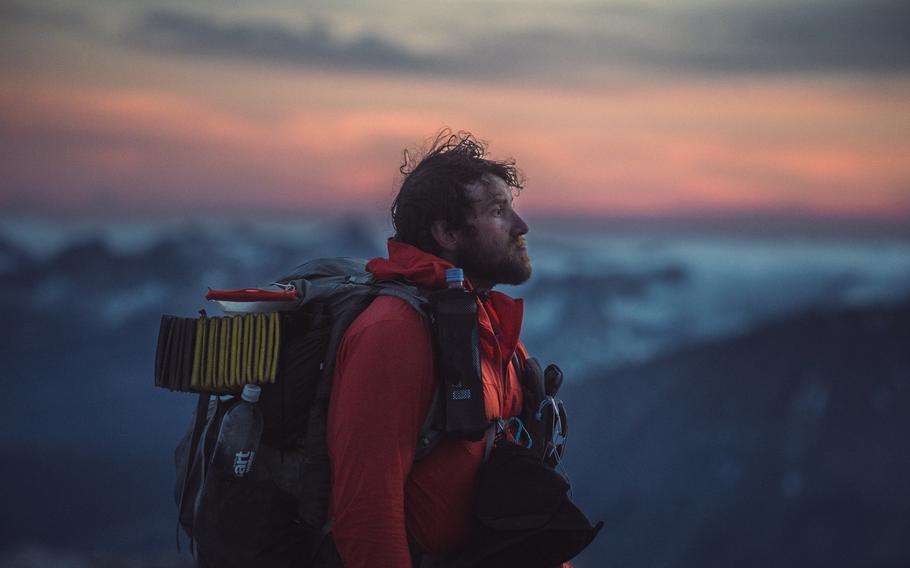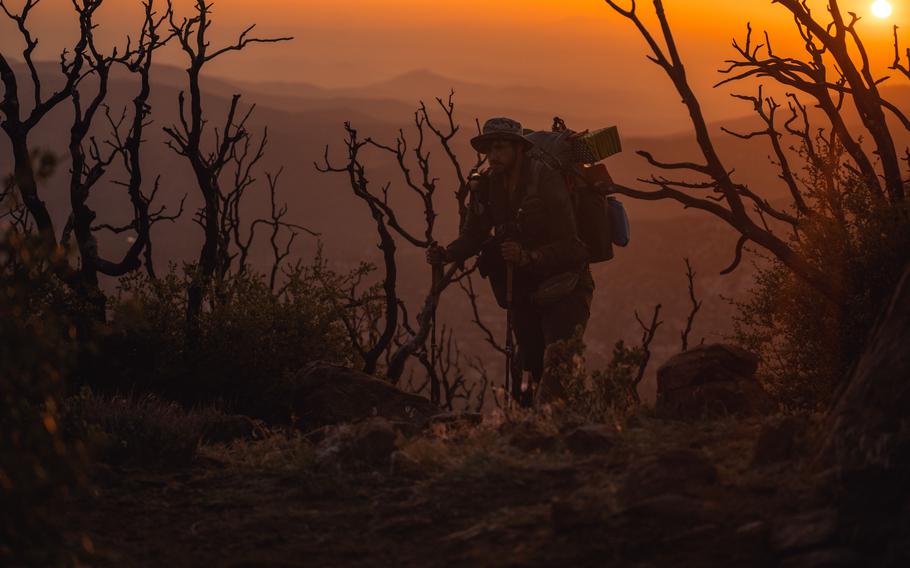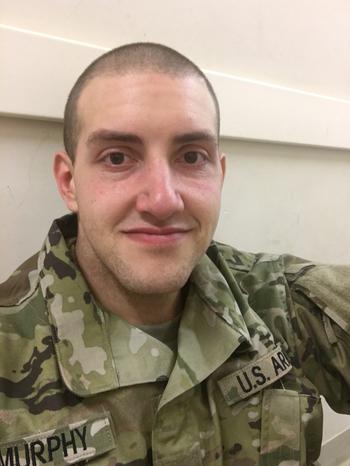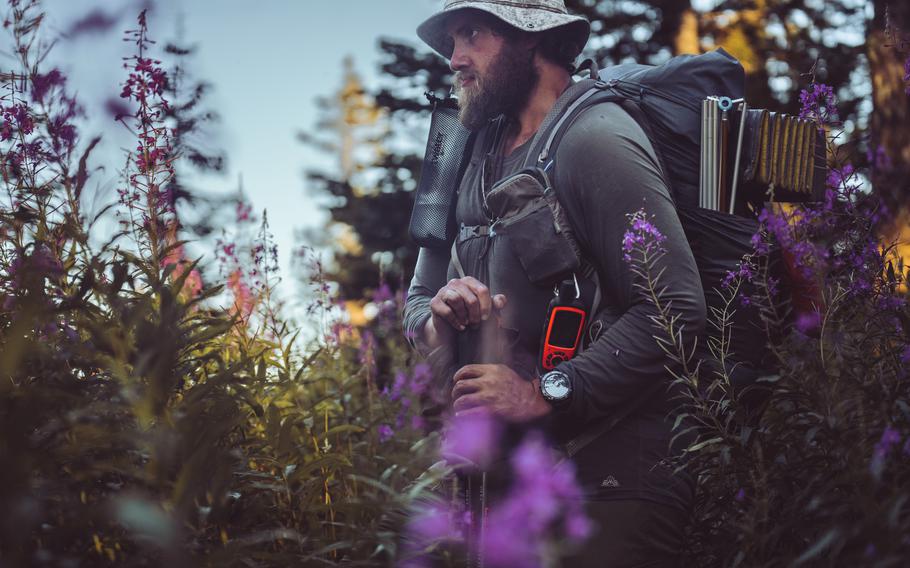
Josh Murphy atop Mount Whitney, Calif., in June 2022. Murphy, who said he trekked the arduous Pacific Crest Trail this year, was sent home from boot camp after the Army determined that he wasn’t medically fit to serve. (Josh Murphy)
Earlier this year, Josh Murphy trekked over 2,300 miles through mountains spanning California, Oregon and Washington state. And he did it all after the Army told him he wasn’t fit enough to serve.
The Pennsylvania native said he thinks about the rejection constantly. He believes there should be more ways for people with certain medical conditions, like him, to prove they can handle the rigors of Army life, or at least qualify for less arduous roles, especially as the service struggles to find new recruits.
Becoming a soldier was the main motivation for Murphy to transform his lifestyle and lose hundreds of pounds over a couple of years. He enlisted afterward, only for military doctors to send him home months later because of leg swelling linked to his former obesity.
“It took me a long time to come to peace with it because it seemed so ridiculous,” Murphy told Stars and Stripes, adding that the swelling had never physically inhibited him, a claim given credence by his six-month, continuous trek of the Pacific Crest Trail.
“It’s insane to me that I’m in this situation,” he said.

Josh Murphy ascends Mount Whitney, Calif., in June 2022. He completed the climb and others after the Army said he was medically unfit to be a soldier. (Josh Murphy)
Growing up in Athens, a small town on the border with New York, Murphy idolized his two uncles, who were Marines, and dreamed of serving himself. But he said he never seriously pursued a career in the armed forces because of his obesity, which stood in the way of many things.
By the time he was 25, in 2015, he weighed nearly 500 pounds, had no college degree and didn’t think he’d ever amount to anything.
His outlook began to change after he met an old friend who had enlisted. During their conversation, Murphy mentioned he’d been reading about Army Special Forces and the friend said he thought Murphy would make a good soldier — if he could lose the weight.
“And that kind of planted a seed,” Murphy recalled. He quit smoking, started eating better and going for walks. Eventually, he joined a gym. When things were difficult, he’d remember what it was all for: to become an Army Ranger or Green Beret.
Two years later, he had lost 200 pounds and visited a recruiting office in Towanda, Pa. He would need to get in better shape still, but now he’d get extra encouragement from recruiters, whom he’d visit every few months.
“I was impressed he lost so much. That screams discipline; that screams dedication,” said Sgt. 1st Class Chance Hendrix, who helped recruit Murphy. “I was flattered that he thought so much of our organization to put in that much time and effort to get there.”
It would take about another two years of hard work and office visits before Murphy was able to sign an Army contract and travel to Fort Benning, Ga., to start basic training.
And that’s when the swelling resumed.
Years of extreme obesity caused Murphy to get lower extremity lymphedema, a type of tissue swelling caused by an accumulation of fluid usually drained though the body’s lymphatic system.
He had a procedure to ease the condition before enlisting, but when medical staff at Fort Benning became aware of it, they said he’d have to leave.
Murphy’s assertions that he could do everything they said lymphedema made difficult or prevented, like wearing boots and rucking, fell on deaf ears, he said.
When he returned to Pennsylvania, he worked with Hendrix to submit a medical waiver, hoping a more nuanced examination of his condition would allow him to reenlist. He wanted a way to prove his physical abilities.
At the same time, he was prepared to abandon the Special Forces route and settle for a noncombat position if he had to. But the Army maintained that he could not be a soldier of any kind because of the condition.

Josh Murphy’s trek of the Pacific Crest Trail took him through the San Jacinto mountains in southern California in April 2022. Murphy was sent home from boot camp after the Army determined that he wasn’t medically fit to serve. (Josh Murphy)
“Sad is the only word,” Hendrix said when asked about the moment he relayed the news to Murphy. “I know there are reasons behind it, but when you put that much work into someone and you see someone put that much work into themselves, it hurts.”
The Army Recruiting Command wouldn’t comment on Murphy’s case specifically but said waivers are rejected when applicants have certain medical conditions “not likely to significantly improve.”
The command also underscored that the Army considers lymphedema a chronic condition, often associated with pain and heaviness, which training and military service can aggravate, suggesting that while Murphy may be able to perform duties required of him now, they’re concerned he might not be able to in the future.
“From the perspective of the individual it’s completely disappointing, but the services have to think about it like this: What if that person is in a combat situation and for some reason this medical condition causes them to not be able to perform?” said Katherine Kuzminski, a senior fellow at the Washington-based Center for a New American Security. “It’s not only that that billet won’t be filled with someone who can perform those duties, but it may actually become a liability for the rest of the unit.”
Weighing the level of risks with the likelihood they’ll occur is why some people with more common ailments like diabetes and asthma are also unable to enlist.
But with the Army missing its recruitment goal by 25% this year and some military officials warning that the U.S. risks falling behind potential adversaries like China if numbers across the services don’t pick up, tailoring minimum medical standards for certain positions could be a way to boost numbers effectively, Kuzminski said.

Josh Murphy takes a selfie at Fort Benning, Ga., shortly before he was sent home by the Army for leg swelling linked to his former obesity. He has since hiked the Pacific Crest Trial and says he hasn’t had any issues related to the swelling. (Josh Murphy)
While groups like special operations have more stringent requirements, most soldiers have the same minimum medical standards, whether they work primarily in an office or do something more physical.
If the Army were able to identify specific roles where the requirements could reasonably be reduced, not only might it help boost numbers, but it could also open doors for those who have been disqualified but still long to serve, like Murphy.
“For a lot of us, the military is really the only chance we realistically, conventionally have at a blank-slate situation for our lives, to right the wrongs of our past,” Murphy said.
With that option taken away from him, he had to come up with a plan B. And while doing so, he remembered a book he read in the barracks at Fort Benning, which mentioned trekking the Pacific Crest Trail.
As he’d already been rucking to prepare for the Special Forces, it seemed like the perfect answer.
“I don’t want to say I got more out of that than I ever would have out of the Army, because I don’t think that’s necessarily true,” Murphy said. “But it was an incredible experience, and I was forced to come to peace with everything and realize there is more I can do for the world in other ways, and I’m motivated to do that now.”
One of those endeavors is working to become a wildland firefighter. He’s also writing a book about his life.
Brandon Pane, who has been friends with Murphy since they were kids, said that despite some low points, Murphy’s story is a positive one with a lesson in it for everyone.
“You don’t have to be a victim of your life’s circumstances,” Pane said. “He’s a shining example of that.”

Josh Murphy traverses wilderness near Mount Hood, Ore., in August 2022, while trekking the entirety of the Pacific Crest Trail. Murphy lost 200 pounds to join the Army but was told he was medically unfit to serve. (Josh Murphy)